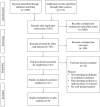Vitamin C intake potentially lowers total cholesterol to improve endothelial function in diabetic patients at increased risk of cardiovascular disease: A systematic review of randomized controlled trials
- PMID: 36386907
- PMCID: PMC9659906
- DOI: 10.3389/fnut.2022.1011002
Vitamin C intake potentially lowers total cholesterol to improve endothelial function in diabetic patients at increased risk of cardiovascular disease: A systematic review of randomized controlled trials
Abstract
Background: Vitamin C is one of the most consumed dietary compounds and contains abundant antioxidant properties that could be essential in improving metabolic function. Thus, the current systematic review analyzed evidence on the beneficial effects of vitamin C intake on cardiovascular disease (CVD)-related outcomes in patients with diabetes or metabolic syndrome.
Methods: To identify relevant randomized control trials (RCTs), a systematic search was run using prominent search engines like PubMed and Google Scholar, from beginning up to March 2022. The modified Black and Downs checklist was used to assess the quality of evidence.
Results: Findings summarized in the current review favor the beneficial effects of vitamin C intake on improving basic metabolic parameters and lowering total cholesterol levels to reduce CVD-risk in subjects with type 2 diabetes or related metabolic diseases. Moreover, vitamin C intake could also reduce the predominant markers of inflammation and oxidative stress like C-reactive protein, interleukin-6, and malondialdehyde. Importantly, these positive outcomes were consistent with improved endothelial function or increased blood flow in these subjects. Predominantly effective doses were 1,000 mg/daily for 4 weeks up to 12 months. The included RCTs presented with the high quality of evidence.
Conclusion: Clinical evidence on the beneficial effects of vitamin C intake or its impact on improving prominent markers of inflammation and oxidative stress in patients with diabetes is still limited. Thus, more RCTs are required to solidify these findings, which is essential to better manage diabetic patients at increased risk of developing CVD.
Keywords: antioxidants; cardiovascular diseases; diabetes mellitus; dietary supplements; metabolic syndrome; vitamin C.
Copyright © 2022 Dludla, Nkambule, Nyambuya, Ziqubu, Mabhida, Mxinwa, Mokgalaboni, Ndevahoma, Hanser, Mazibuko-Mbeje, Basson, Sabbatinelli and Tiano.
Conflict of interest statement
The authors declare that the research was conducted in the absence of any commercial or financial relationships that could be construed as a potential conflict of interest.
Figures



Similar articles
-
Potential Benefits of Coffee Consumption on Improving Biomarkers of Oxidative Stress and Inflammation in Healthy Individuals and Those at Increased Risk of Cardiovascular Disease.Molecules. 2023 Sep 5;28(18):6440. doi: 10.3390/molecules28186440. Molecules. 2023. PMID: 37764216 Free PMC article. Review.
-
Tea consumption and its effects on primary and secondary prevention of coronary artery disease: Qualitative synthesis of evidence from randomized controlled trials.Clin Nutr ESPEN. 2021 Feb;41:77-87. doi: 10.1016/j.clnesp.2020.11.006. Epub 2020 Dec 2. Clin Nutr ESPEN. 2021. PMID: 33487310 Review.
-
Curcumin supplementation improves biomarkers of oxidative stress and inflammation in conditions of obesity, type 2 diabetes and NAFLD: updating the status of clinical evidence.Food Funct. 2021 Dec 13;12(24):12235-12249. doi: 10.1039/d1fo02696h. Food Funct. 2021. PMID: 34847213
-
Authors' perspective: What is the optimum intake of vitamin C in humans?Crit Rev Food Sci Nutr. 2012;52(9):815-29. doi: 10.1080/10408398.2011.649149. Crit Rev Food Sci Nutr. 2012. PMID: 22698272 Review.
-
Diet and obstructive lung diseases.Epidemiol Rev. 2001;23(2):268-87. doi: 10.1093/oxfordjournals.epirev.a000806. Epidemiol Rev. 2001. PMID: 12192737 Review.
Cited by
-
Polycystic Ovary Syndrome and Oxidative Stress-From Bench to Bedside.Int J Mol Sci. 2023 Sep 15;24(18):14126. doi: 10.3390/ijms241814126. Int J Mol Sci. 2023. PMID: 37762427 Free PMC article. Review.
-
Bioactive Properties, Bioavailability Profiles, and Clinical Evidence of the Potential Benefits of Black Pepper (Piper nigrum) and Red Pepper (Capsicum annum) against Diverse Metabolic Complications.Molecules. 2023 Sep 11;28(18):6569. doi: 10.3390/molecules28186569. Molecules. 2023. PMID: 37764345 Free PMC article. Review.
-
Therapeutic potential role of vitamin C in prevention and control of heart transplant rejection and cardiac allograft vasculopathy. A need for consideration.Health Sci Rep. 2023 Nov 5;6(11):e1687. doi: 10.1002/hsr2.1687. eCollection 2023 Nov. Health Sci Rep. 2023. PMID: 37936616 Free PMC article.
-
Vitamin C in Cardiovascular Disease: From Molecular Mechanisms to Clinical Evidence and Therapeutic Applications.Antioxidants (Basel). 2025 Apr 23;14(5):506. doi: 10.3390/antiox14050506. Antioxidants (Basel). 2025. PMID: 40427388 Free PMC article. Review.
-
Okra ameliorates hyperglycaemia in pre-diabetic and type 2 diabetic patients: A systematic review and meta-analysis of the clinical evidence.Front Pharmacol. 2023 Apr 3;14:1132650. doi: 10.3389/fphar.2023.1132650. eCollection 2023. Front Pharmacol. 2023. PMID: 37077817 Free PMC article.
References
-
- World Health Organization [WHO]. The Top 10 Causes Of Death. Geneva: World Health Organization; (2020).
-
- American Heart Association [AHA]. Cardiovascular Disease And Diabetes. Dallas, TX: American Heart Association; (2022).
Publication types
LinkOut - more resources
Full Text Sources
Research Materials

